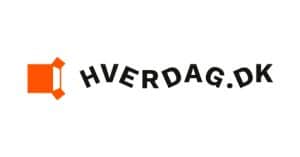
Pernille Ristorp Sørensen is HR-Business Partner at Group Logistic (hverdag.dk) and in 2020 entered into collaboration with Woba to acquire a dynamic and more realtime picture of employee engagement.


(Pernille Ristorp Sørensen, HR Business Partner, Group Logistic (hverdag.dk))
A realization that employee well-being and engagement are the key words in the fight against ‘The Great Resignation’ – which counts a significant increase in sick leave and resignations, made Pernille choose Woba back in 2020.
Group Logistic actually had a fairly well-functioning working environment at the time, but after realizing the need to get a more realtime picture of the employees’ well-being and prioritizing the close feeling with the internal atmosphere, Pernille saw a need to learn more about the company’s working environment and not least to prevent any problems and dissatisfaction.
“We are a company that cares enormously about the well-being of our employees, and before Woba we had an online mailbox where employees could sign in with a stone in their shoe. And when we came across Woba, we thought it could help us create a culture where employees also remembered to report it if they had something.”
In order to clarify a valid starting point for the well-being and commitment as a whole, Pernille decided in consultation with Woba that they should start the collaboration with ongoing pulsing engagement surveys – in order to ‘take the pulse’ and get a solid, quick insight into the situation.
After some time with continuous pulse surveys, it was followed up with the implementation of the statutory workplace assessment.
At the first pulse survey with Woba in February 2021 looked like this:

The visualization is taken directly from Woba’s platform and the numbers shown are an expression of an amalgamation of the employees’ answers – which can ultimately be on a score between 1 and 4. Of which 4 is top grade for well-being.
Woba is dynamic monitoring – and assesses all responses with a specific color code.
The green numbers show a fine and acceptable engagement. The yellow fields are an indication that it is not quite good – and that the company needs to pay attention.
And the red ones are of course an expression that there is a problem or danger of a problem, and that a specific action plan is necessary to meet and deal with the specific problem.
At Group Logistic, a ‘red flag’ can be seen in relation to the immediate management and well-being in general.
Pernille therefore chose to run monthly pulse surveys – to keep a sharp eye on the employees’ well-being.
In March, there were no red numbers, which was great, but Pernille’s daily desire for insight into the employees’ well-being meant that she chose to stick to the monthly pulse measurements. Which is also clearly the approach we recommend from Woba’s side

In July and August, some specific problems in one department began to stir – and Pernille kept a sharp eye on the development.
In fact, the satisfaction score with the immediate supervisor was only 1.1 in July.
The result spoke for itself.
And Pernille localized the problem.
This led to thorough HR work, where Pernille tackled the problem ‘by it’s roots’:
“I started to see a downward trend. Therefore, with the help of Woba’s material, I prepared a concrete interview guide and started holding individual interviews with all employees… Through this, we became aware that there was a problem with the department manager in question.”
And she continues:
“The closest leader goes from having a score of 4 in February, where it fluctuates more and more negatively towards August, when interviews are done. And then we will take specific action in mid-September…”
And by ‘specific action’, Pernille means that they simply chose to dismiss the manager in question.
It was immediately a drastic decision, but nevertheless the right one.
Because the following month looked like this:

This shows a significant improvement in well-being. And it is clear that there is now a markedly greater satisfaction with the newly appointed head of department.
Group Logistic actually saw a whopping 300% increase in satisfaction after the handling.
Yes, then – first of all the obvious. That Group Logistic was able to locate the specific problem in connection with employee dissatisfaction. And if you as a company have first located and mapped it, then the most important knowledge is in place and from here it is just a matter of drawing up action plans that deal with the problem. But there is far more to it than that. Because this thorough (and indispensable) engagement work that Pernille, together with Woba, has put in place, also brings many other positive things.
It might speak for itself.
But nevertheless, up until now they have only worked reactively under the auspices of HR.
A survey has been done. Typically a Health and Safety Assessment every three years. Collected the results, analyzed them and implemented action plans from there. Typically a process that has had a duration of 6-12 months.
Which results in a hopelessly outdated scenario.
With dynamic measurements, it is suddenly possible to act PROACTIVELY on the issues – and thereby deal with them BEFORE they end up in sick leave or resignations.
In addition, the color codes and the system’s intelligent way of warning about problems are an important tool in working with well-being. In this way, you are always informed and can manage to take the necessary precautions – before the company has to face the horribly large costs associated with employee loss.
Perhaps in fact the most important parameter in this case.
Because if Pernille had not chosen the monthly, anonymous pulse measurements, the problem might not have become apparent – so quickly. Because how many openly want to complain about the boss? It can be something so borderline and uncomfortable to have to say one’s frustrations out loud.
Many thoughts can come to mind – even if both company and management work purposefully with engagement and the working environment – as Group Logistic already did. There can really be many reasons why it is not an easy task when the immediate manager does not act appropriately and live up to the employees’ expectations.
The employee engagement measurement will in itself give the employee a feeling of having an important influence.
What can now even more shake the employee’s feeling of being valued and important in the workplace is the moment that the results are taken seriously by the management – and that real action is taken on the problems.
Pernille and Group Logistic clearly show in this case how much the employees are valued and taken seriously in this company. That will undoubtedly increase well-being. And not least give the employees the courage to also be honest in the future about any problems. For a specific action initiative like this shows that there is a great deal of respect and trust from the management towards the employees – and that the employees can expect nothing less than respect and trust when they report dissatisfaction.
It gives peace of mind – and creates basic well-being in the workplace.
Woba newsletter sign-up
Merkur Cooperative Bank, Denmark’s leading values-based financial institution, has enhanced diversity and well-being in the workplace with the assistance of Woba.io. Discover how Merkur utilized Woba’s platform and guidance to achieve impressive results in the work environment.
Merkur Cooperative Bank has a central goal: to create a workplace characterized by diversity, inclusivity, and equality. They aimed to establish an attractive workplace that could attract new talents while fostering happier and more engaged employees. Employees were to feel that everyone is treated fairly, irrespective of gender, age, ethnic background, sexual orientation, or other differences. Simultaneously, it was crucial for them that diversity and inclusion initiatives were not merely a management focus but were also palpable throughout the organization.
Merkur Cooperative Bank implemented Woba’s platform for their annual well-being assessments and mandatory workplace assessments (APV). With Woba, they acquired the right tools to measure and gain direct insights from employees to understand the diversity in the work environment.
Merkur was particularly pleased with the opportunity to combine quantitative and qualitative insights in their surveys. This not only provided an overall picture of general well-being but also allowed for a deeper understanding by analyzing comments from individual employees.
Lastly, Woba made it easy for them to translate all the collected feedback from employees into concrete action plans in areas where improvement was needed, both at the organizational and departmental levels.
“The platform is intuitive and easy to handle. I have especially been very pleased with the automatic presentation and risk map,” says Katrine Rosengren Norup, HR Manager at Merkur Cooperative Bank.
Energi Viborg is committed to promoting well-being within their organization and collaborates closely with Woba to achieve this goal.
“We prioritize well-being at Energi Viborg,” says Dorte Danielsen, Executive Secretary/HR at Energi Viborg.
Together with Kira, their Customer Success Manager from Woba, we have explored how Energi Viborg has adapted the Woba platform to develop their own approach to well-being work with the aim of increasing response rates and enhancing employee well-being using Woba.
At Energi Viborg, they used to conduct well-being surveys every other week, asking 5 questions based on the WHO-5 well-being index. However, they faced a challenge as the response rate had dropped below 50%. There was a need for a system that could delve deeper into work-related well-being.
Through collaboration between management, union representatives, and occupational health and safety representatives, it was decided that they needed a system where they could formulate their own questions, customize them for departments, and allow for comments to be added to each question. This led them to choose Woba, which met their needs.
“Everything aligned perfectly with our desire to prioritize well-being and not just rely on an annual well-being survey,” Dorte says about the choice of Woba.
Merkur Cooperative Bank, Denmark’s leading values-based financial institution, has enhanced diversity and well-being in the workplace with the assistance of Woba.io. Discover how Merkur utilized Woba’s platform and guidance to achieve impressive results in the work environment.
Merkur Cooperative Bank has a central goal: to create a workplace characterized by diversity, inclusivity, and equality. They aimed to establish an attractive workplace that could attract new talents while fostering happier and more engaged employees. Employees were to feel that everyone is treated fairly, irrespective of gender, age, ethnic background, sexual orientation, or other differences. Simultaneously, it was crucial for them that diversity and inclusion initiatives were not merely a management focus but were also palpable throughout the organization.
Merkur Cooperative Bank implemented Woba’s platform for their annual well-being assessments and mandatory workplace assessments (APV). With Woba, they acquired the right tools to measure and gain direct insights from employees to understand the diversity in the work environment.
Merkur was particularly pleased with the opportunity to combine quantitative and qualitative insights in their surveys. This not only provided an overall picture of general well-being but also allowed for a deeper understanding by analyzing comments from individual employees.
Lastly, Woba made it easy for them to translate all the collected feedback from employees into concrete action plans in areas where improvement was needed, both at the organizational and departmental levels.
“The platform is intuitive and easy to handle. I have especially been very pleased with the automatic presentation and risk map,” says Katrine Rosengren Norup, HR Manager at Merkur Cooperative Bank.
Energi Viborg is committed to promoting well-being within their organization and collaborates closely with Woba to achieve this goal.
“We prioritize well-being at Energi Viborg,” says Dorte Danielsen, Executive Secretary/HR at Energi Viborg.
Together with Kira, their Customer Success Manager from Woba, we have explored how Energi Viborg has adapted the Woba platform to develop their own approach to well-being work with the aim of increasing response rates and enhancing employee well-being using Woba.
At Energi Viborg, they used to conduct well-being surveys every other week, asking 5 questions based on the WHO-5 well-being index. However, they faced a challenge as the response rate had dropped below 50%. There was a need for a system that could delve deeper into work-related well-being.
Through collaboration between management, union representatives, and occupational health and safety representatives, it was decided that they needed a system where they could formulate their own questions, customize them for departments, and allow for comments to be added to each question. This led them to choose Woba, which met their needs.
“Everything aligned perfectly with our desire to prioritize well-being and not just rely on an annual well-being survey,” Dorte says about the choice of Woba.
Companies now know well that when they invest DKK 1 in the working environment, they get DKK 2 back. Despite this fact, no tools have yet been able to measure this effect.
“Woba, on the other hand, gives us access to a comprehensive risk assessment system and thus a long-awaited real-time overview of our customers’ known and unknown risks within the working environment. This helps us to assist with the best possible preventive advice based on current data insights. The Woba system also helps our customers to measure the effect of their implemented action plans on, for example, the level of well-being and sickness absence. In this way, our customers gain new and very concrete knowledge of where their risk areas are, what they should do about them and the effect of their time and efforts”
Lars Christensen, Managing Director Willis Towers Watson DK.
Willis Towers Watson (WTW) was founded in 1828 and is today a world-leading global advisory and brokerage firm. WTW is driven by a central vision to help their customers identify risks, so that the company can best prevent human losses and at the same time get the best conditions for creating growth and success. In other words – WTW helps clients around the world turn risk into business growth.
In June 2018, WTW first contacted Woba. WTW was looking for a digital tool that could give their customers the opportunity to measure the temperature of their risks in the working environment and at the same time give WTW access to a digital overview of their customers’ risk areas. After many months of negotiation, WTW and Woba suddenly found the key and common thread between the two businesses – and it was the statutory Workplace Assessment (APV) that cracked the code:
“In English, APV is called ‘Health & Safety Risk Assessment’, and it actually describes much better what it is about – namely a risk assessment of companies’ health and safety status. It also paints a much clearer picture of the APV’s real meaning and how WTW can use Woba’s APV as a risk management tool where they can help their customers prevent the loss of key employees before the damage happens‘
says Woba’s CEO, Malene Madsen.
In January 2020, WTW and Woba established a co-branding collaboration. WTW chose to buy a license for Woba’s complete APV system, so that in future they can offer their customers a service that enables them to meet the Norwegian Working Environment Authority’s legal requirements for the APV in an easy and efficient way. The strategic collaboration between WTW and Woba was launched on 9 December and is already live in the Danish companies. Søren Egens Petersen talks here about the importance of the solution for their customers today:
“A high level of employee well-being is one of the most important success criteria in any company, and therefore it is absolutely crucial that the management has a good overview of the areas in the company where there is a particular need to make an effort to eliminate dissatisfaction . With Woba, the company not only gets the overview, but also concrete recommendations for what can be done to increase well-being”.
says well-being expert Søren Egens Petersen from Corporate Health at Willis Towers Watson.
A 100% complete, legally binding system for completing the APV – completely automatically
Industry-specific Health and Safety Risk Assessment questionnaires from the Danish Working Environment Authority for all industries and sectors.
Address
Woba ApS
Landgreven 3
1301 København K
CVR: DK37609641
Phone
(UK) +44 330 808 9197
HQ DK) +45 40 31 50 30
(SE) +46 8 580 986 87